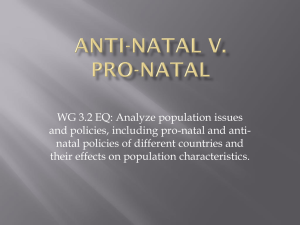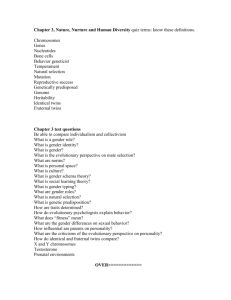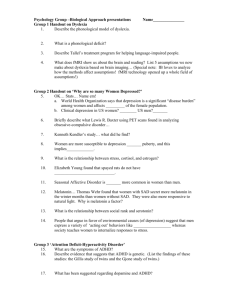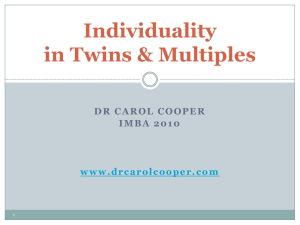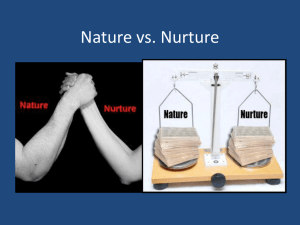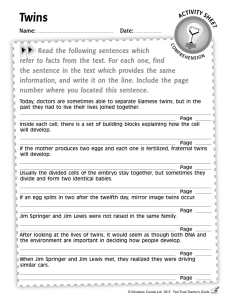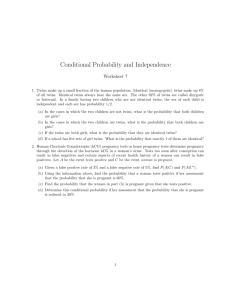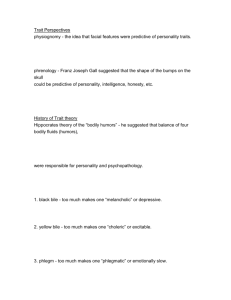Detailed Summary of Information Covered During the MATR
advertisement
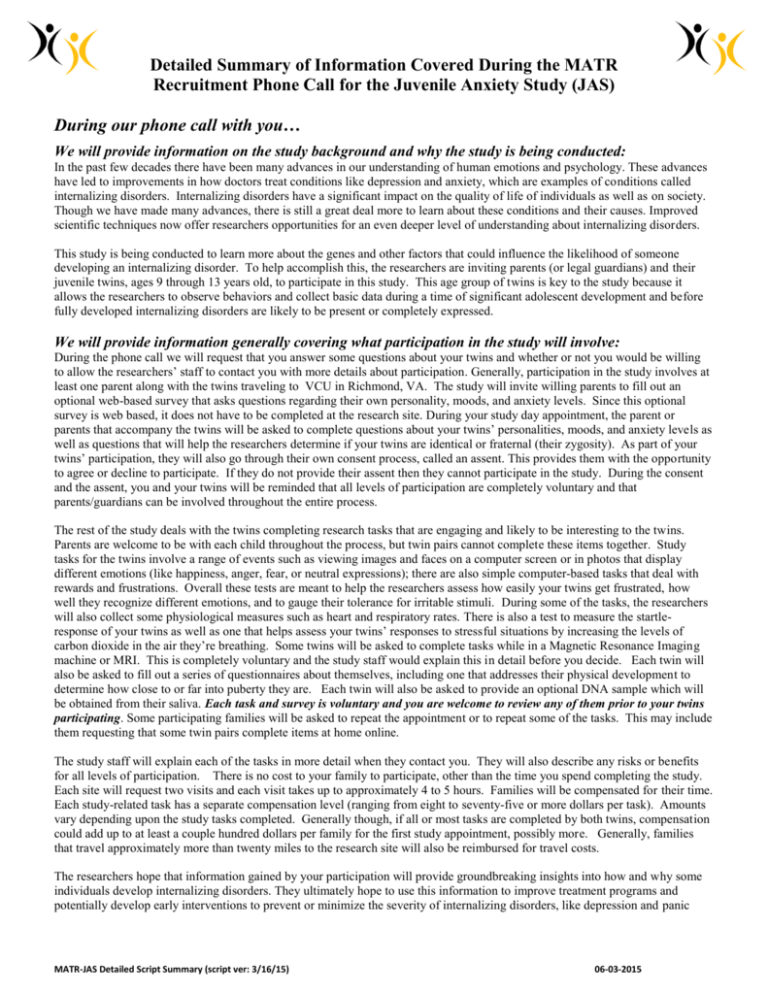
Detailed Summary of Information Covered During the MATR Recruitment Phone Call for the Juvenile Anxiety Study (JAS) During our phone call with you… We will provide information on the study background and why the study is being conducted: In the past few decades there have been many advances in our understanding of human emotions and psychology. These advances have led to improvements in how doctors treat conditions like depression and anxiety, which are examples of conditions called internalizing disorders. Internalizing disorders have a significant impact on the quality of life of individuals as well as on society. Though we have made many advances, there is still a great deal more to learn about these conditions and their causes. Improved scientific techniques now offer researchers opportunities for an even deeper level of understanding about internalizing disorders. This study is being conducted to learn more about the genes and other factors that could influence the likelihood of someone developing an internalizing disorder. To help accomplish this, the researchers are inviting parents (or legal guardians) and their juvenile twins, ages 9 through 13 years old, to participate in this study. This age group of twins is key to the study because it allows the researchers to observe behaviors and collect basic data during a time of significant adolescent development and before fully developed internalizing disorders are likely to be present or completely expressed. We will provide information generally covering what participation in the study will involve: During the phone call we will request that you answer some questions about your twins and whether or not you would be willing to allow the researchers’ staff to contact you with more details about participation. Generally, participation in the study involves at least one parent along with the twins traveling to VCU in Richmond, VA. The study will invite willing parents to fill out an optional web-based survey that asks questions regarding their own personality, moods, and anxiety levels. Since this optional survey is web based, it does not have to be completed at the research site. During your study day appointment, the parent or parents that accompany the twins will be asked to complete questions about your twins’ personalities, moods, and anxiety levels as well as questions that will help the researchers determine if your twins are identical or fraternal (their zygosity). As part of your twins’ participation, they will also go through their own consent process, called an assent. This provides them with the opportunity to agree or decline to participate. If they do not provide their assent then they cannot participate in the study. During the consent and the assent, you and your twins will be reminded that all levels of participation are completely voluntary and that parents/guardians can be involved throughout the entire process. The rest of the study deals with the twins completing research tasks that are engaging and likely to be interesting to the twins. Parents are welcome to be with each child throughout the process, but twin pairs cannot complete these items together. Study tasks for the twins involve a range of events such as viewing images and faces on a computer screen or in photos that display different emotions (like happiness, anger, fear, or neutral expressions); there are also simple computer-based tasks that deal with rewards and frustrations. Overall these tests are meant to help the researchers assess how easily your twins get frustrated, how well they recognize different emotions, and to gauge their tolerance for irritable stimuli. During some of the tasks, the researchers will also collect some physiological measures such as heart and respiratory rates. There is also a test to measure the startleresponse of your twins as well as one that helps assess your twins’ responses to stressful situations by increasing the levels of carbon dioxide in the air they’re breathing. Some twins will be asked to complete tasks while in a Magnetic Resonance Imaging machine or MRI. This is completely voluntary and the study staff would explain this in detail before you decide. Each twin will also be asked to fill out a series of questionnaires about themselves, including one that addresses their physical development to determine how close to or far into puberty they are. Each twin will also be asked to provide an optional DNA sample which will be obtained from their saliva. Each task and survey is voluntary and you are welcome to review any of them prior to your twins participating. Some participating families will be asked to repeat the appointment or to repeat some of the tasks. This may include them requesting that some twin pairs complete items at home online. The study staff will explain each of the tasks in more detail when they contact you. They will also describe any risks or benefits for all levels of participation. There is no cost to your family to participate, other than the time you spend completing the study. Each site will request two visits and each visit takes up to approximately 4 to 5 hours. Families will be compensated for their time. Each study-related task has a separate compensation level (ranging from eight to seventy-five or more dollars per task). Amounts vary depending upon the study tasks completed. Generally though, if all or most tasks are completed by both twins, compensation could add up to at least a couple hundred dollars per family for the first study appointment, possibly more. Generally, families that travel approximately more than twenty miles to the research site will also be reimbursed for travel costs. The researchers hope that information gained by your participation will provide groundbreaking insights into how and why some individuals develop internalizing disorders. They ultimately hope to use this information to improve treatment programs and potentially develop early interventions to prevent or minimize the severity of internalizing disorders, like depression and panic MATR-JAS Detailed Script Summary (script ver: 3/16/15) 06-03-2015 attacks. So, while your family may not benefit directly from participating in the study, you and your twins may experience satisfaction in knowing that your efforts might possibly improve the emotional well-being of future generations. We will request information the study will use to help determine your twins’ eligibility: During the phone call we need to complete an eligibility screener questionnaire with you about each of your twins. If you give us your permission, we share the answers with the study so that they can determine if your twins are eligible. The questions will include some items about your twin’s health, their learning style, their mental well-being, and then a few sets of personality-related questions (more information below). If you are eligible, the study will send you a ‘heads-up’ letter letting you know to expect their call. If you are not currently eligible to participate, we may call you back at a later date to see if your eligibility might have changed. Just prior to starting the eligibility questions, we have to read a consent statement (copied below) and get your permission to share your information and answers with the study staff. For those that are willing, we tape record the consent. You do not have to be tape recorded to complete the consent. Description of what the screener questions cover: The screener questions will include questions about your twins’ general health (do they have asthma, diabetes, heart condition, gastrointestinal disorders, psychological, medications, etc); learning (have they been diagnosed with Autism, do they have an IEP, 504 plans, etc); and personality (in reference to their likelihood of being anxious in certain situations or displaying behaviors that might be associated with a depressed mood recently). Answers to these questions are used by the study staff to determine if your twins have a medical condition or learning or social interaction disability that would make them ineligible for study participation. The Consent Statement: The following is the consent that will be read to you. Prior to reading the consent we will ask you if we can record it (this recording will not have your name). You can still provide consent whether it is recorded or not. The choice is yours. [If yes to recorded consent—start here] Alright, I’ve turned on the tape recorder and I’m speaking with contact ID __________. This number is used for our purposes to identify this recording rather than using your name. [If no to being recorded—start here] If I say something you do not understand, please stop me and ask me to explain what I said. This telephone call is the first step for participating in a study which hopes to advance understanding on factors that influence the development of internalizing disorders. We will ask you a set of screener questions about each of your twins. These questions will be about your twins’ moods, anxiety levels, and other personality traits. There will also be some questions to make sure neither twin has a health condition that would prevent them from participating. You may not get any direct benefit from participating in these screener questions but your answers will help the researchers determine your and your twins’ eligibility for participation. The questions will take approximately ten minutes. We take your privacy very seriously and will make every effort to keep the information you provide confidential. Your answers to these questions will be identified with a number. Only very select MATR personnel have the authorization and access needed to match this number and data to your name. If you give us your permission to do so, then the data you provide during this call as well as your date of birth, your twins’ date of birth, genders, race, zygosity and contact information will be shared with the researchers. The MATR may also retain any information you provide in this phone call in order to select you for contact regarding future studies, to possibly match this data with other data to answer general scientific questions, and in the administration of the registry. Information the study will share back to the MATR will be related to your participation status in the study, such as the date of your study enrollment and any changes in your participation status. The MATR will also be informed of any updates to your contact and zygosity information. If you have allowed us to record this consent, the consent recording will be saved in a secure computer file and will only be identified by a number. Information from this call and the taped consent may be looked at or copied for research or legal purposes by the sponsor or people who ensure that the rights of research participants are protected. This may include people at the Department of Health and Human Services or people at Virginia Commonwealth University. It’s normal for these people to be able to review information from research studies. If you have questions about your rights as a research participant please call VCU’s Office of Research at (804) 827-2157, but if your questions are about your eligibility status for the study or other studyrelated topics, please the MATR a call at1-800-URA-TWIN (1-800-872-8946). MATR-JAS Detailed Script Summary (script ver: 3/16/15) 06-03-2015 You can choose not to complete the screener questions, but this may mean that you will not be eligible to participate in the study. You are welcome to stop your participation at any time or to only answer items you’re comfortable answering. We will ask you the following: Do we have your permission to share your contact information, eligibility data, date of birth and twins’ date of birth, genders, race, and zygosity with the study? If you say yes, we proceed with the rest of the call which includes the screener questions and verifying contact information. If you say no, we end the call. We will also ask you if you want a copy of the consent statement sent to you for your records. MATR-JAS Detailed Script Summary (script ver: 3/16/15) 06-03-2015
